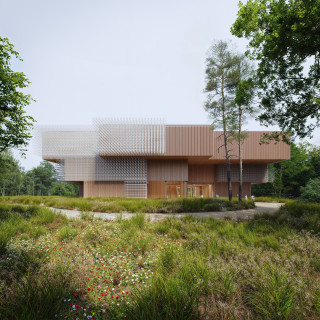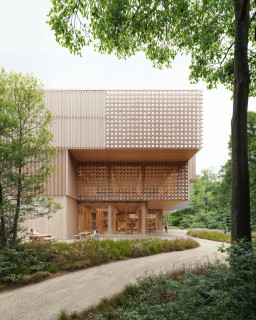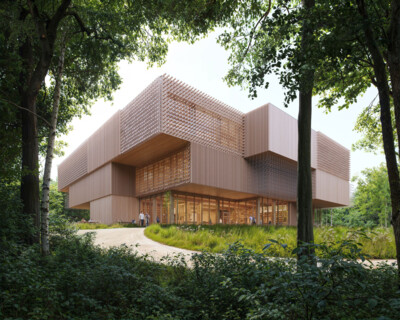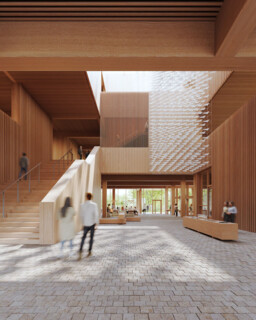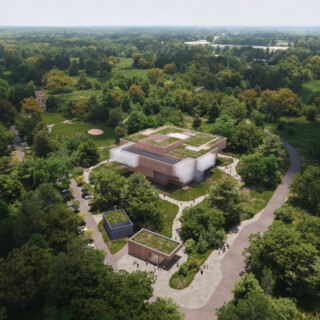- wa-ID
- wa-2038126
- Aktualisiert am
- 27.06.2024
- Auslober
- Xylopolis Centre for Wood Art and Science
- Bekanntgabe
- 06.06.2024
- Fertigstellung
- vsl. Ende 2027
Press release by WXCA
Warsaw, 6th June 2024
Xylopolis Centre for Wood Art and Science:
An Architectural Reflection on the Human-Nature Relationship
• Inspired by the renowned Polish Pavilion at Expo 2020 in Dubai, the Xylopolis Centre for Wood Art and Science is poised to become a contemporary cultural landmark, seamlessly blending educational, exhibition, and recreational functions.
• The sculpted form of the Centre, modelled after the award-winning Polish Pavilion at Expo 2020, will serve as both an exhibit in its own right and an immersive landscape element, engaging the senses and creating a dynamic backdrop for Xylopolis’ programmes and the vibrant cultural praxis of Podlasie.
• Local government representatives highlight this project—the establishment of the Xylopolis headquarters—as strategic for the region, aiming to create a cultural and educational hub that integrates the local community while promoting the traditions, nature, and brand of Podlasie both in Poland and Europe.
• The architectural vision has been crafted by the architects at WXCA.
Kinetic Sculpture and Synergy with Nature
The architectural form concept of the Xylopolis Centre for Wood Art and Science stems from a profound contemplation of the human-nature relationship, exploring coexistence, human impact on the natural ecosystem, and the ensuing responsibilities. In response to the ecological and social challenges of the future, WXCA architects envision a design imbued with a belief in human wisdom and the potential for rational, responsible resource management. This philosophy is rooted in the multi-generational traditions and history of Podlasie’s wooden culture, as well as the region’s cutting-edge wood construction technologies. Thus, this reflection is expressed not only symbolically but also through specific formal and technological proposals.
The architectural concept for the Xylopolis headquarters draws inspiration from WXCA’s design for the Polish Pavilion at Expo 2020 in Dubai, where the original exhibition of the Xylopolis Centre for Wood Art and Science was showcased. This internationally acclaimed project also delves into the synergy between tradition and modernity, embodying the idea of sustainable development in harmony with nature. Similarly to the Expo 2020 project, the Xylopolis Pavilion features an upward-expanding, modular structure framed by a kinetic installation depicting a flock of birds in flight—a metaphor for mobility, dynamic global changes, and the flow of information and knowledge.
The architects opted for techniques that highlight the aesthetic qualities of wood, the primary construction and finishing material for the pavilion. Wooden claddings with varied textures and movable façade elements will create an interactive spatial installation powered by air movement and the play of light and shadow throughout the day and year, showcasing the multifaceted role of natural phenomena in creating a sense of comfort and harmony. In this way, the pavilion itself will become an exhibit in the landscape, an immersive setting for Xylopolis’ activities and the living praxis of Podlasie culture.
Thanks to ecological technologies, it will exemplify the symbiotic relationship between humans and nature. The project incorporates comprehensive and multi-faceted analyses aimed at minimising the embodied carbon footprint throughout the lifecycle of the building and its components, primarily through the use of wood supplemented with low-emission materials (low-emission steel and concrete). The wooden and modular orthogonal structure allows for the prefabrication of elements (walls, and external and internal finishes), thus, reducing on-site construction work. A significant emphasis has been placed on spatial flexibility to minimise potential future waste generation.
The Xylopolis Centre for Wood Art and Science also features a unique garden spanning over 4 hectares. The landscape design reflects the Centre’s founding principles, integrating natural elements with modern technologies. The project maximises the use of the natural terrain and includes solutions such as the selection of local, resilient plants that require low energy and water inputs while supporting natural retention (dry stream systems and a retention pond). Additionally, the area is equipped with energy-efficient retention, infiltration, and lighting systems, alongside various engineering solutions that promote efficient and sustainable resource management, making it resilient to current and future climate changes, including droughts, strong winds, rainfall, and fires.
The Xylopolis Cultural Hub
The main building of Xylopolis is a central four-storey pavilion. The ground floor is organised around a multi-level central hall surrounded by educational workshop and exhibition spaces, as well as recreational areas including dining facilities, a shop, and a play area for children. The design enables seamless integration of indoor and outdoor spaces, allowing internal activities to extend into garden zones. The upper floors offer multifunctional spaces dedicated to various cultural fields: science, technology, and art, including a hall for large-scale paintings by Leon Tarasewicz, a multifunctional room for performances, lectures, and debates, and spaces for intermedia installations focused on ecological education and the dissemination of knowledge through presentations of the latest scientific and technological achievements.
In WXCA’s concept, the pavilion’s surroundings are an integral element of the Xylopolis experience, featuring dedicated outdoor activity and recreational areas among greenery: themed gardens, an art park, an amphitheatre, a saline graduation tower, and an observation tower overlooking traditional Podlasie wooden architecture. The entire site will be accessible to all, forming an attractive and cohesive infrastructure and, together with the nearby Podlasie Museum of Folk Culture, creating a space of value for the regional community and identity.
Local government representatives describe the establishment of the Xylopolis headquarters in Wasilków near Białystok as a strategic regional project, aiming to create a cultural and educational centre that integrates the local community and promotes the traditions, nature, and brand of Podlasie externally. As a public utility facility, Xylopolis will be a place for the popularisation of art and wood science, hosting exhibitions, conferences, and workshops. Completion is planned for the end of 2027.
Project information:
Name: Xylopolis Centre for Wood Art and Science
Location: Wasilków, Poland
Design: 2023
Client: Xylopolis Centre for Wood Art and Science
Architect: WXCA
Project authors: Szczepan Wroński, Marta Sękulska-Wrońska, Michał Czerwiński, Anna Dobek-Lenczewska, Paulina Kucharska, Michał Kalinowski, Elżbieta Leoniewska, Jakub Matela, Jakub Kołomański, Maciej Sachse, Ewelina Szeląg, Paweł Wolanin, Klaudia Gołaszewska, Michał Sokołowski
WXCA is a Polish architectural design studio specializing in projects of public spaces and public facilities, including cultural institutions. The studio was nominated for the Mies van der Rohe Award for its designs of the Memorial Museum in Palmiry and the European Centre for Geological Education in Chęciny. WXCA was also responsible for the design of the Poland Pavilion at the Expo 2020 in Dubai and the Museum Complex in Warsaw housing the Polish History Museum and the Polish Army Museum.
www.wxca.pl
Social media:
www.linkedin.com/company/wxca
www.facebook.com/wxcawarsaw
www.instagram.com/wxca_architects/
Warsaw, 6th June 2024
Xylopolis Centre for Wood Art and Science:
An Architectural Reflection on the Human-Nature Relationship
• Inspired by the renowned Polish Pavilion at Expo 2020 in Dubai, the Xylopolis Centre for Wood Art and Science is poised to become a contemporary cultural landmark, seamlessly blending educational, exhibition, and recreational functions.
• The sculpted form of the Centre, modelled after the award-winning Polish Pavilion at Expo 2020, will serve as both an exhibit in its own right and an immersive landscape element, engaging the senses and creating a dynamic backdrop for Xylopolis’ programmes and the vibrant cultural praxis of Podlasie.
• Local government representatives highlight this project—the establishment of the Xylopolis headquarters—as strategic for the region, aiming to create a cultural and educational hub that integrates the local community while promoting the traditions, nature, and brand of Podlasie both in Poland and Europe.
• The architectural vision has been crafted by the architects at WXCA.
Kinetic Sculpture and Synergy with Nature
The architectural form concept of the Xylopolis Centre for Wood Art and Science stems from a profound contemplation of the human-nature relationship, exploring coexistence, human impact on the natural ecosystem, and the ensuing responsibilities. In response to the ecological and social challenges of the future, WXCA architects envision a design imbued with a belief in human wisdom and the potential for rational, responsible resource management. This philosophy is rooted in the multi-generational traditions and history of Podlasie’s wooden culture, as well as the region’s cutting-edge wood construction technologies. Thus, this reflection is expressed not only symbolically but also through specific formal and technological proposals.
The architectural concept for the Xylopolis headquarters draws inspiration from WXCA’s design for the Polish Pavilion at Expo 2020 in Dubai, where the original exhibition of the Xylopolis Centre for Wood Art and Science was showcased. This internationally acclaimed project also delves into the synergy between tradition and modernity, embodying the idea of sustainable development in harmony with nature. Similarly to the Expo 2020 project, the Xylopolis Pavilion features an upward-expanding, modular structure framed by a kinetic installation depicting a flock of birds in flight—a metaphor for mobility, dynamic global changes, and the flow of information and knowledge.
The architects opted for techniques that highlight the aesthetic qualities of wood, the primary construction and finishing material for the pavilion. Wooden claddings with varied textures and movable façade elements will create an interactive spatial installation powered by air movement and the play of light and shadow throughout the day and year, showcasing the multifaceted role of natural phenomena in creating a sense of comfort and harmony. In this way, the pavilion itself will become an exhibit in the landscape, an immersive setting for Xylopolis’ activities and the living praxis of Podlasie culture.
Thanks to ecological technologies, it will exemplify the symbiotic relationship between humans and nature. The project incorporates comprehensive and multi-faceted analyses aimed at minimising the embodied carbon footprint throughout the lifecycle of the building and its components, primarily through the use of wood supplemented with low-emission materials (low-emission steel and concrete). The wooden and modular orthogonal structure allows for the prefabrication of elements (walls, and external and internal finishes), thus, reducing on-site construction work. A significant emphasis has been placed on spatial flexibility to minimise potential future waste generation.
The Xylopolis Centre for Wood Art and Science also features a unique garden spanning over 4 hectares. The landscape design reflects the Centre’s founding principles, integrating natural elements with modern technologies. The project maximises the use of the natural terrain and includes solutions such as the selection of local, resilient plants that require low energy and water inputs while supporting natural retention (dry stream systems and a retention pond). Additionally, the area is equipped with energy-efficient retention, infiltration, and lighting systems, alongside various engineering solutions that promote efficient and sustainable resource management, making it resilient to current and future climate changes, including droughts, strong winds, rainfall, and fires.
The Xylopolis Cultural Hub
The main building of Xylopolis is a central four-storey pavilion. The ground floor is organised around a multi-level central hall surrounded by educational workshop and exhibition spaces, as well as recreational areas including dining facilities, a shop, and a play area for children. The design enables seamless integration of indoor and outdoor spaces, allowing internal activities to extend into garden zones. The upper floors offer multifunctional spaces dedicated to various cultural fields: science, technology, and art, including a hall for large-scale paintings by Leon Tarasewicz, a multifunctional room for performances, lectures, and debates, and spaces for intermedia installations focused on ecological education and the dissemination of knowledge through presentations of the latest scientific and technological achievements.
In WXCA’s concept, the pavilion’s surroundings are an integral element of the Xylopolis experience, featuring dedicated outdoor activity and recreational areas among greenery: themed gardens, an art park, an amphitheatre, a saline graduation tower, and an observation tower overlooking traditional Podlasie wooden architecture. The entire site will be accessible to all, forming an attractive and cohesive infrastructure and, together with the nearby Podlasie Museum of Folk Culture, creating a space of value for the regional community and identity.
Local government representatives describe the establishment of the Xylopolis headquarters in Wasilków near Białystok as a strategic regional project, aiming to create a cultural and educational centre that integrates the local community and promotes the traditions, nature, and brand of Podlasie externally. As a public utility facility, Xylopolis will be a place for the popularisation of art and wood science, hosting exhibitions, conferences, and workshops. Completion is planned for the end of 2027.
Project information:
Name: Xylopolis Centre for Wood Art and Science
Location: Wasilków, Poland
Design: 2023
Client: Xylopolis Centre for Wood Art and Science
Architect: WXCA
Project authors: Szczepan Wroński, Marta Sękulska-Wrońska, Michał Czerwiński, Anna Dobek-Lenczewska, Paulina Kucharska, Michał Kalinowski, Elżbieta Leoniewska, Jakub Matela, Jakub Kołomański, Maciej Sachse, Ewelina Szeląg, Paweł Wolanin, Klaudia Gołaszewska, Michał Sokołowski
WXCA is a Polish architectural design studio specializing in projects of public spaces and public facilities, including cultural institutions. The studio was nominated for the Mies van der Rohe Award for its designs of the Memorial Museum in Palmiry and the European Centre for Geological Education in Chęciny. WXCA was also responsible for the design of the Poland Pavilion at the Expo 2020 in Dubai and the Museum Complex in Warsaw housing the Polish History Museum and the Polish Army Museum.
www.wxca.pl
Social media:
www.linkedin.com/company/wxca
www.facebook.com/wxcawarsaw
www.instagram.com/wxca_architects/
